In Somalia, BUILD is managing the new normal by facilitating inclusive political processes and #SomaliaElection amidst the coronavirus pandemicThe coronavirus pandemic in Somalia has not put a pause on the al-Shabab violent insurgency, nor has it increased the prospects of talks between the federal government, led by President Mohamed Abdullahi Mohamed “Farmaajo,” and the state governments. Rather, the health crisis has threatened to delay or undermine the steps the government needs to take to manage the ongoing conflict, which includes resuming the dialogues, conducting a constitutional review and coordinating anticipated elections after almost two decades – all of which depend upon in-person gatherings.
As COVID-19 began to sweep across the world and Somalia, the U.S. Agency for International Development and Creative Associates International worked to adjust the Bringing Unity, Integrity and Legitimacy to Democracy (BUILD) project to support political and electoral processes in Somalia and help mitigate the impact of COVID-19. USAID and BUILD worked quickly to implement three categories of response:
First: We are keeping partners and vulnerable groups safe by adapting physical distancing guidelines and providing essential personal protective equipment (PPE) for all of our programing – managing one of the first public spaces in Somalia to do so.
Second: Because COVID-19 compounds political risks in Somalia, including the possibility that political dialogues and preparations for future elections will be stalled, we are bringing resources to ensure continued support for these dialogues, as well as for the vulnerable populations at risk of being further excluded from political processes.
Third: We are using existing relationships and resources to provide public health information in all of our outreach efforts and dialogues to slow the spread of COVID-19.
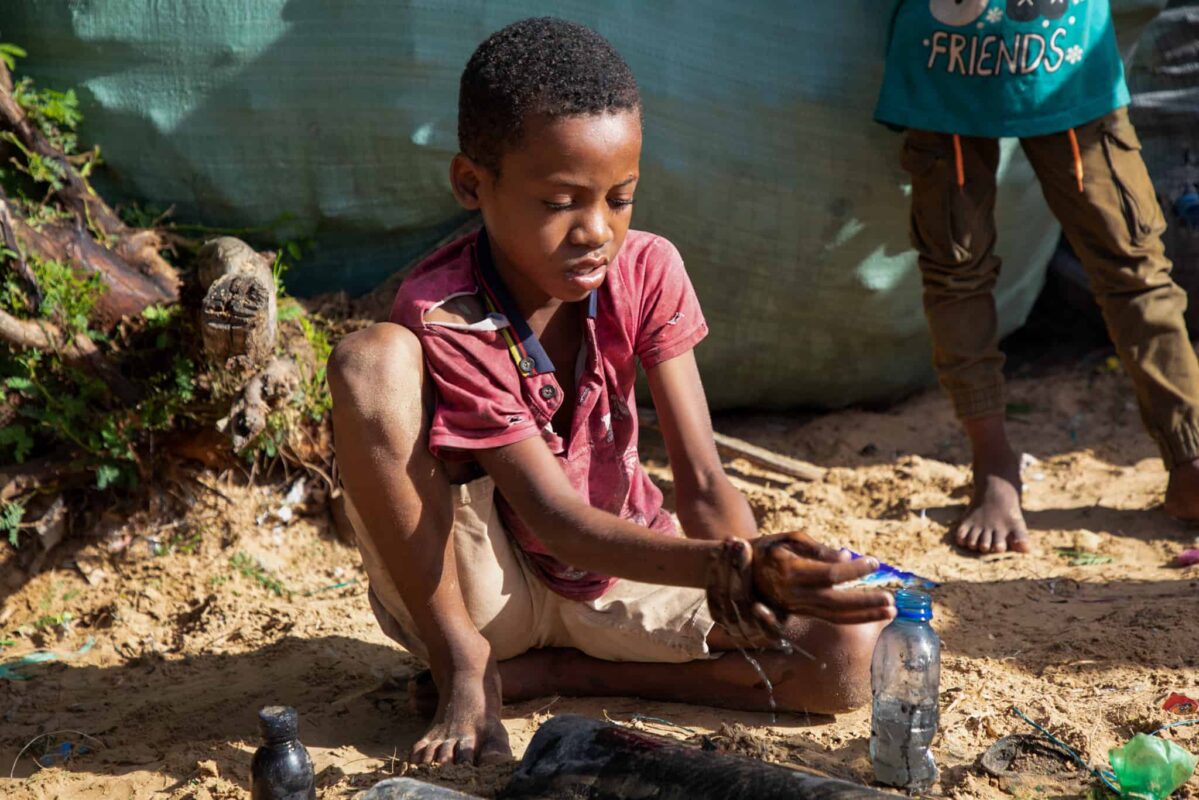
A resource center opens amidst the pandemic
A volatile security situation and a weak public health system – compounded by the drought, locust infestations and now coronavirus – would make the already fragile political dialogue even less likely to take place. The local partners, however, were eager to collaborate to make such dialogues possible in the face of steep challenges.
In mid-April, BUILD opened the first resource center in Mogadishu where civil society, political parties, government and the media could safely engage using personal protective equipment and observing physical distancing rules. Called the Political Party and Civil Society Resource Center, it is one of the first public facilities supplied with masks, gloves and disinfectant that allows Somalis to continue political dialogues safely, discussing the pandemic’s impact on already delayed political processes.
During a panel session held at the Political Party and Civil Society Resource Center, speakers and hosts donned masks and gloves, while members of the public engaged safely through social and traditional media.
“When the first COVID-19 case reached Somalia in March, just as we were about to open the first resource center for more than 80 nascent parties, we knew we would require drastic measures to keep participants safe and apply our resources in the most relevant way,” says BUILD’s Chief of Party Rudi Elbling.
“Over the four years BUILD has been in operations, we have become used to reinventing ourselves — whether to provide critical voter registration equipment, or helping push through a sexual offenses law, or now to support and protect political dialogues despite the challenge of COVID-19 – to move the democratic processes forward,” he says.
Wheelchair accessible and equipped with high speed internet and protective equipment, BUILD’s Political Party and Civil Society Resource Center is essential to conducting political dialogues in Somalia. With two more centers in the pipeline, BUILD will continue to provide key groups such as the National Independent Election Commission, internally displaced persons and people with disabilities with facilities and equipment to engage in political dialogue as the pandemic unfolds.
The current resource center, and the two regional centers in the making will continue to be sources of updated information about COVID-19, its symptoms and prevention methods.
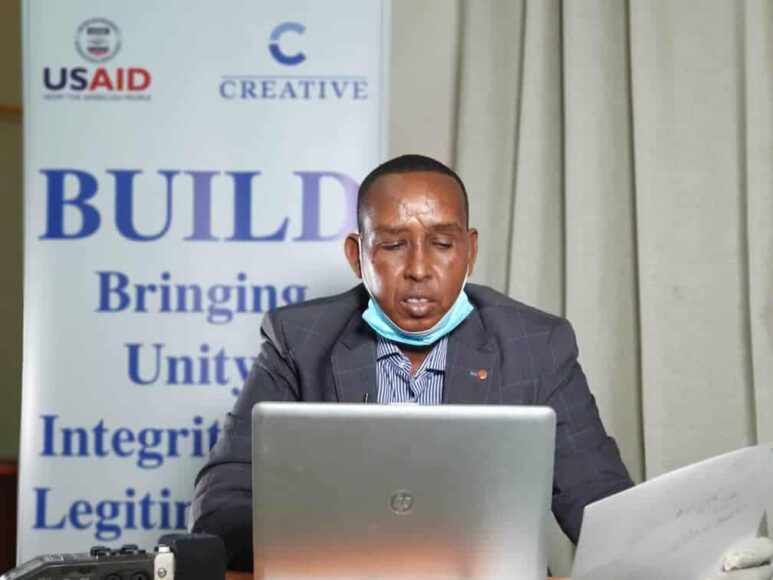
Maintaining productive dialogue
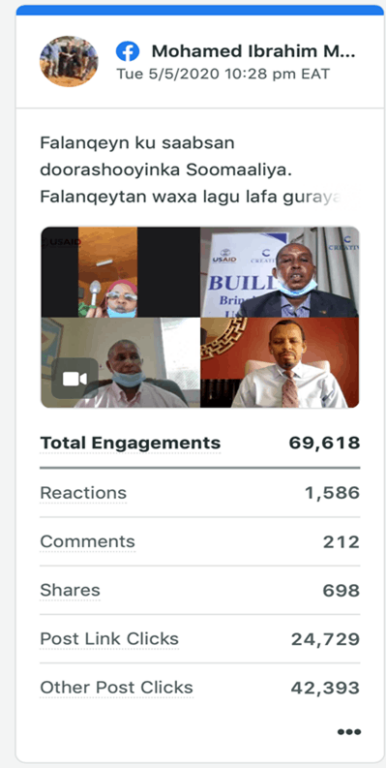
Through two grants with Somalia Non-State Actors and Puntland Non-State Actors’ Association, as well as direct engagement with media and journalists, BUILD organized a series of political dialogues with a COVID-19 lens. The first dialogue reached almost 46,000 Somalis, mainly youth aged 35 and younger, in the Benadir Region.
While reaching youth through social media is typical, the program was able to reach a wider audience through broadcast on Dalsan TV. The dialogue included the representatives of the Ministry of Health and Somalia’s Medical Association and focused heavily on COVID-19 related developments and information on the virus’s symptoms and prevention methods.
Mohamed Ibrahim Nur, a Somali journalist and social media influencer known as Moalimuu, hosted the second political dialogue, putting an emphasis on elections and the debate around holding or postponing elections in light of COVID-19, looking at other elections in the region and around the world.
“While reactions reflected a split among Somalis on this issue, it also sparked a lot of interest, which is what we need,” says Moalimuu, whose Facebook page boasts hundreds of thousands followers, with this discussion reaching 370,000 Somalis within two days.
A third political dialogue reached 62,000 Somalis, focusing on how the most vulnerable Somalis’ political participation is further endangered by COVID-19. This session featured members of parliament working on the electoral law, government and civil society representatives, as well as a prominent internally displaced persons (IDP) camp leader.
While all panelists at this session agreed that the constitutional right to participation extends to IDPs, there is no clear path for that in practice. Social media commentators pointed to the lack of engagement on the part of IDPs themselves or those representing them directly. Taking insight from the dialogue, BUILD staff visited one of the largest IDP camps in Somalia, disseminating information about elections and the pandemic, and personal protective equipment.
BUILD is currently working to expand the resource center’s availability to the IDPs concentrated in several camps in Mogadishu, focusing on access to information and disease prevention.
Empowering women
One of BUILD’s most important priorities has been elevating women’s participation in politics. The project partnered with the Somali organization Women Pioneers for Peace and Life to host a remarkable political party fair for young women activists, resulting in 100 women joining political parties.
While this kind of outreach is no longer safe under COVID-19 conditions, promoting the inclusion of women in the political process is only more urgent. Among other initiatives, BUILD is supporting an online consultative process on political party law, with special attention to encouraging women to express their needs.
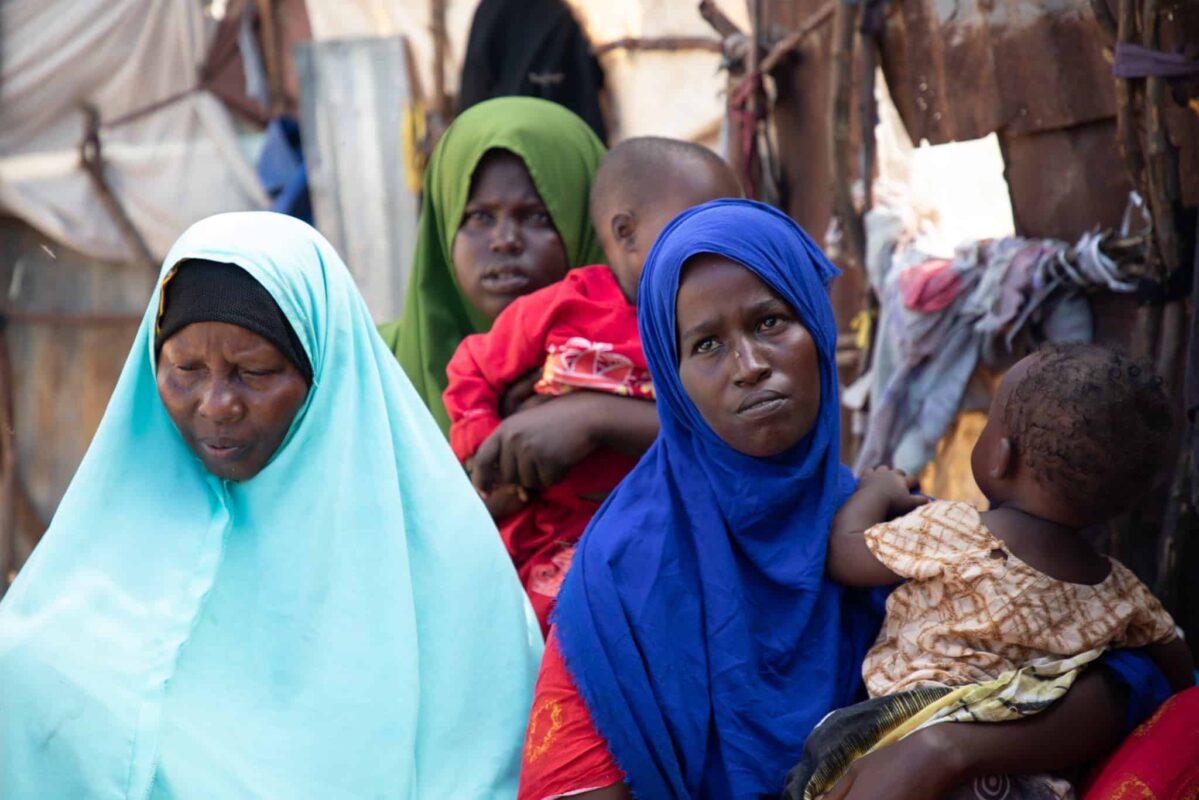
Prevention tips through radio drama
BUILD has partnered with the British Broadcasting Corporation’s Media Action to develop radio dramas to further spread the word about COVID-19 and how to prevent it.
Radio journalists from Benadir, South West State, Galmudug, Hirshabele, Jubaland and Puntland were trained to conduct interactive discussions. From April 5 to June 21, BUILD transmitted 15 radio segments as part of Gole Joog Broadcast Episodes on six radio stations reaching more than 97,000 Somalis, 30 percent of whom were women.
The trainings not only enhance the producers’ content creation abilities, but also foster discussions on political processes, including COVID-19’s impact. Through these trainings and subsequent media broadcasting, Somali citizens have been exposed to quality media content that enhances knowledge and understanding of the intersection of political issues and COVID-19 in their country.
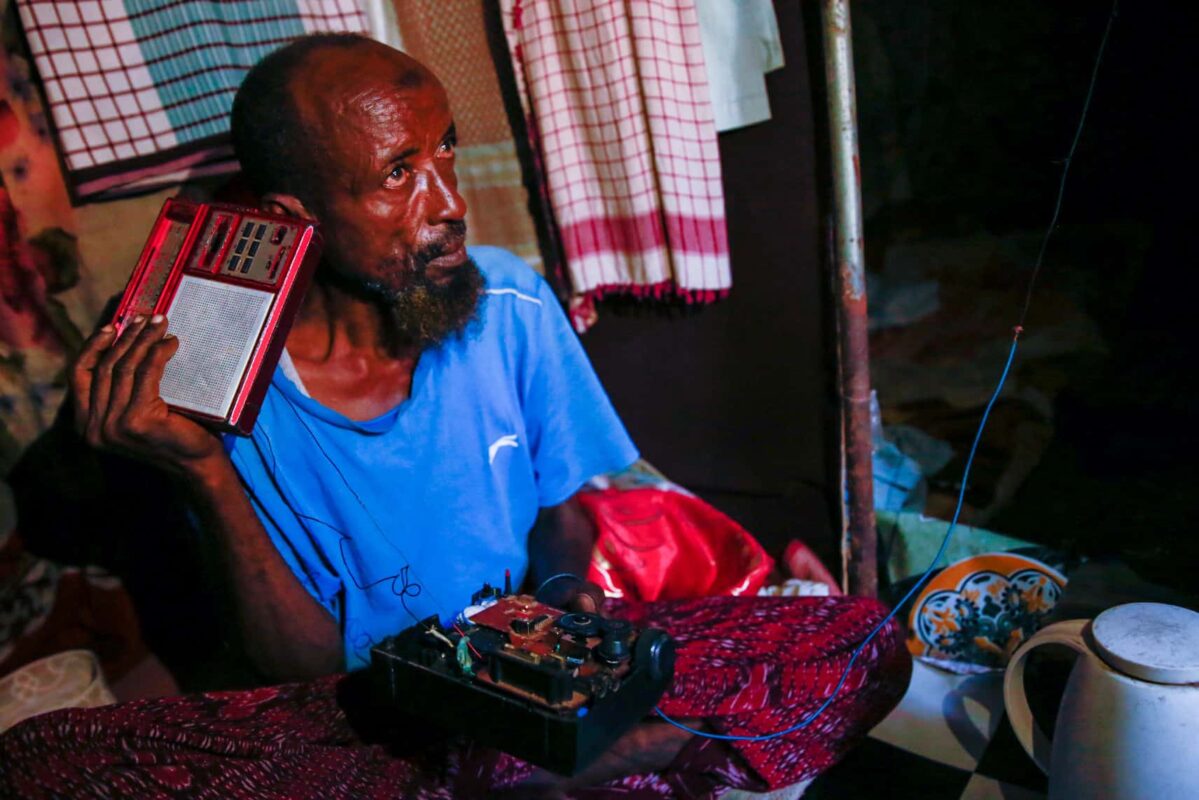
The intersection of health and security
Medical experts warn that Somalia could become one of the worst-affected parts of the world if the virus takes hold. As of June 21, the Somali Ministry of Health announced 2,961 cases of COVID-19 and 92 fatalities.
Although the positive test rates remain high, overall infection rates are showing signs of a slow down with no new fatalities reported in a week. The public health response has included closures of schools and other institutions, as well as limited distribution of test kits and protective gear to medical professionals.
But 30 years of conflict have devastated the medical system, which cannot feasibly respond to a real outbreak. Additionally, hundreds of thousands of displaced Somalis are crowded into camps, making both hygiene and social distancing difficult. The disease poses a major threat not just as a public health issue but as a potential cause of further destabilization in Somalia.
“The spread of the disease in the densely populated IDP camps would be disastrous both from a health and security perspective,” says Elbling. “Al-Shabab has already linked coronavirus to foreign implementers and countering this narrative will require engaging with Somali voters, especially the most vulnerable among them.”
As Somalia weathers the COVID-19 crisis, Elbling says USAID and BUILD will continue to find ways to respond by relying closely on Somali staff and partners.
“We are only at the start of the COVID-19 pandemic in Somalia, but we are also at a critical point of achieving progress on national dialogues within the government, as well as with the civil society and other political actors” he says. “We need to maintain these dialogues regardless of the coronavirus using every resource at our disposal.”
Since the coronavirus outbreak in Somalia in March, which was followed by severe movement restrictions and exodus of international implementers and diplomats, BUILD has reached more than half a million Somalis in half of the nation’s states to prepare them for the upcoming elections.
Tihana Bartulac Blanc is the Senior Project Director of the Electoral Integrity and Education Practice Area at Creative Associates International. All photos were taken by BUILD’s multimedia officer Ahmed Fais.